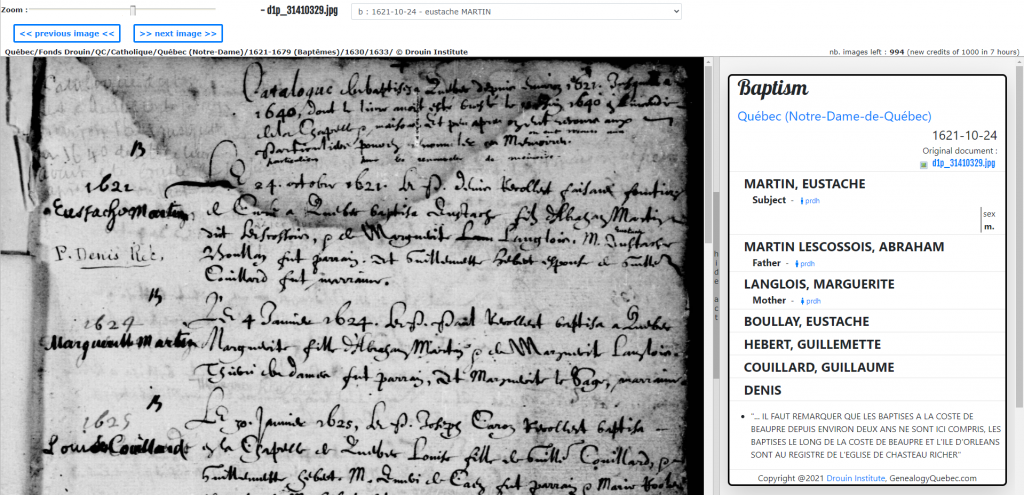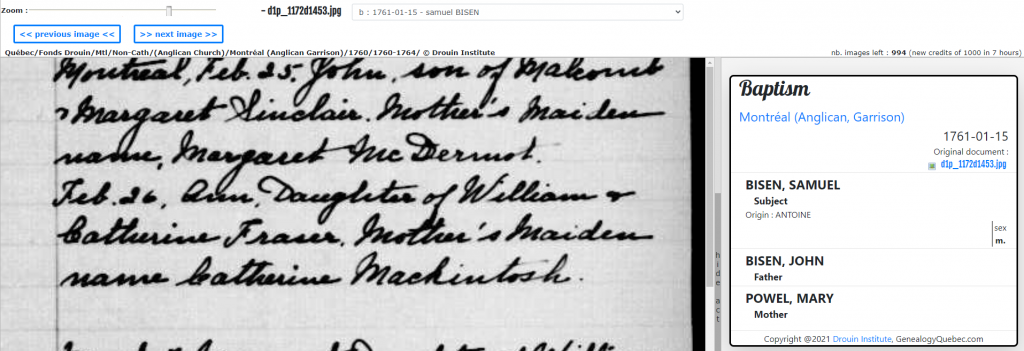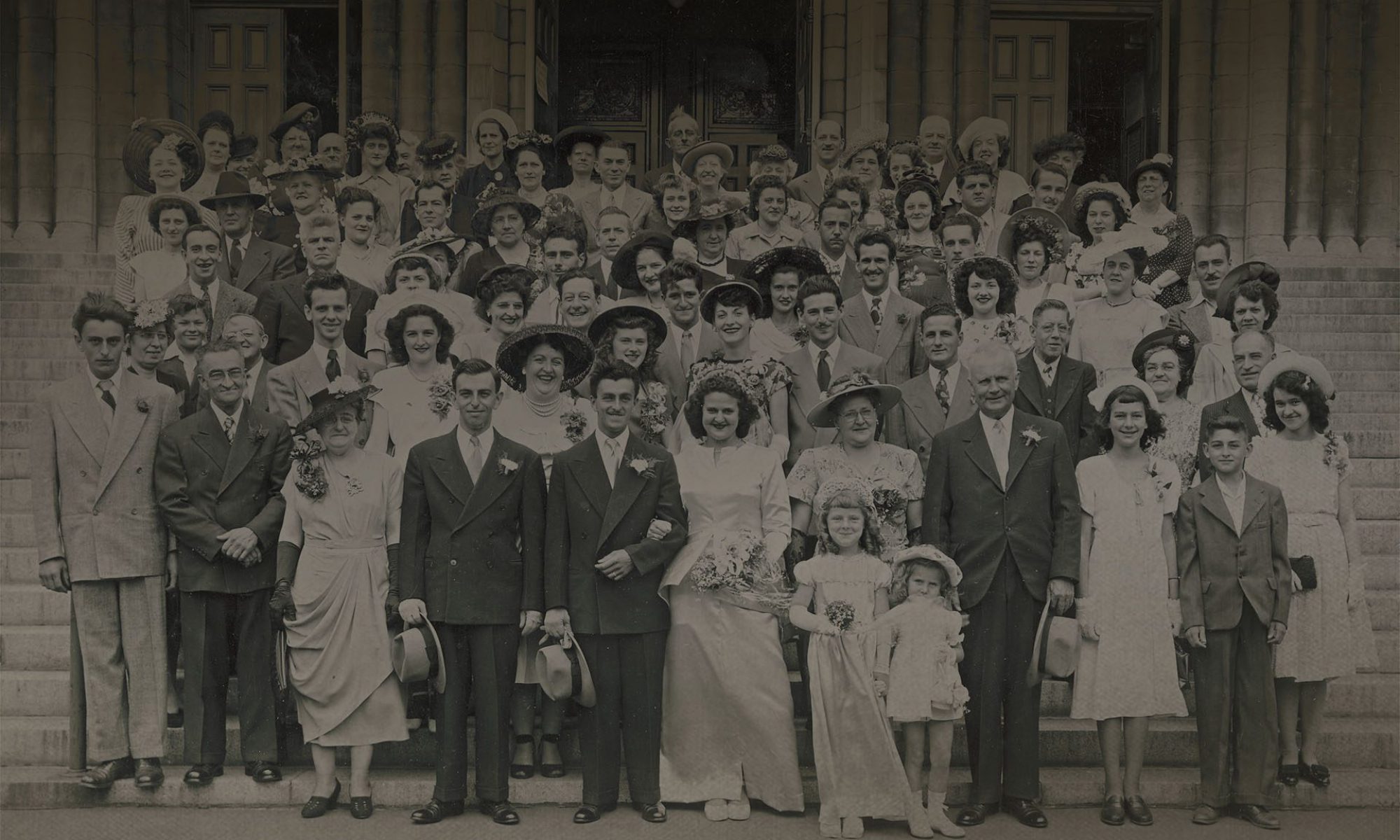This post is also available in: Français

October 24, 2021 marks the 400th anniversary of the establishment of civil registration in New France. On this exact date, Father Joseph Denis, priest of the Notre-Dame de Québec parish, baptized Eustache Martin, son of Marguerite Langlois and Abraham Martin dit l’Écossais [who gave his name to the Plains of Abraham]. Since the beginnings of the colony, the registration of vital events was entrusted to the ecclesiastical authority which enforced royal ordinances such as the keeping of duplicate registers – one being kept by the parish, the other being deposited at the local court.

From 1703, the drafting of records by the parish priests of New France was done according to the rules prescribed by the Ritual of the Diocese of Quebec. When New France was ceded to England through the Treaty of Paris in 1763, the colonial authorities maintained the old French laws relating to the registration of vital events. In 1774, the Quebec Act confirmed that the keeping of parish registers, whether Catholic or Protestant, was the responsibility of the clergy.
In 1760, Anglo-Protestant registers were introduced following the British Conquest. Protestant marriages were celebrated in accordance with the Marriage Act, a British law of 1754. The first of theses registers is that of the Anglican Garrison Church in Montreal, which covers the 1760 to 1764 period. Between 1760 and 1770, Protestant parishes opened in Montreal , Quebec, Trois-Rivières and Sorel.

In 1795, a law enacted by the Parliament of Lower Canada confirmed the application of the French ordinances while adapting them to the new situation of the country. Over the next two centuries, very few changes were made to the registration of vital events apart from a few minor adjustments resulting from the adoption of a new Civil Code in 1866.
We had to wait a hundred years before a major change was made to Quebec’s civil registration with the introduction of civil marriage which, since 1968, can be celebrated in courthouses and other authorized places. With the number of different denominations, and consequently, the number of celebrants authorized to register events having reached a new high – 5,417 registers were deposited for the year 1989 only – a change was in order. In 1991, a new civil code was adopted, confirming the prerogative of the State in matters of registration of vital events.
In 1994, the government implemented a modern civil registration system and created the position of Directeur de l’état civil which provided Quebec with a single non-denominational register. The new regulations transferred the legal responsibility of recording births, marriages and deaths in the province from the churches to the State. Despite these new regulations, priests and ministers of all faiths are still considered civil officers for the celebration of religious marriages, even if most unions are now contracted before a civil officer approved by the Directeur de l’état civil.
Between 1621 and 1800, the priests of the 159 Catholic parishes of Quebec recorded 690,000 vital events, to which we must add the few thousand Protestant events recorded from 1766 onwards. Between 1800 and 1900, seven million vital events were recorded, a number that grew to more than seventeen million for the 1901 to 2000 period. The Quebec archives now hold nearly 25 million vital event records spanning 4 centuries.
Consult all of Quebec’s parish registers from 1621 to the 1940s by subscribing to Genealogy Quebec today!
Civil registration is an essential source of information for any genealogical, historical or demographic research. The quality of Quebec’s parish registers is unique in the world and the baptism, marriage and burial records drafted by ecclesiastical authorities since the beginning of New France have survived time without many gaps.
Until 1994, parish records were accessible to researchers, but they were closed to consultation with the advent of the new provisions on civil registration. This situation makes genealogical research more difficult and deprives Quebecers and their descendants of an important part of their collective memory. Genealogists such as myself understand that the protection of personal information is a priority in modern times, but shouldn’t our administrative authorities find compromises so that family history research can continue, and to allow the current and future generations the opportunity to learn about their roots?
Recently, the Fédération québécoise des sociétés de généalogie and the Directeur de l’état civil du Québec held exploratory meetings that lead to a certain openness with regard to the consultation of death certificates between 1994 and 2021. It is to be hoped that these discussions will allow the dissemination of certain genealogical information while respecting the privacy of Quebecers. Quebec’s civil registration remains an essential collective asset for reconstructing the history of our families across space and time.
Marcel Fournier, AIG
Historian and genealogist



